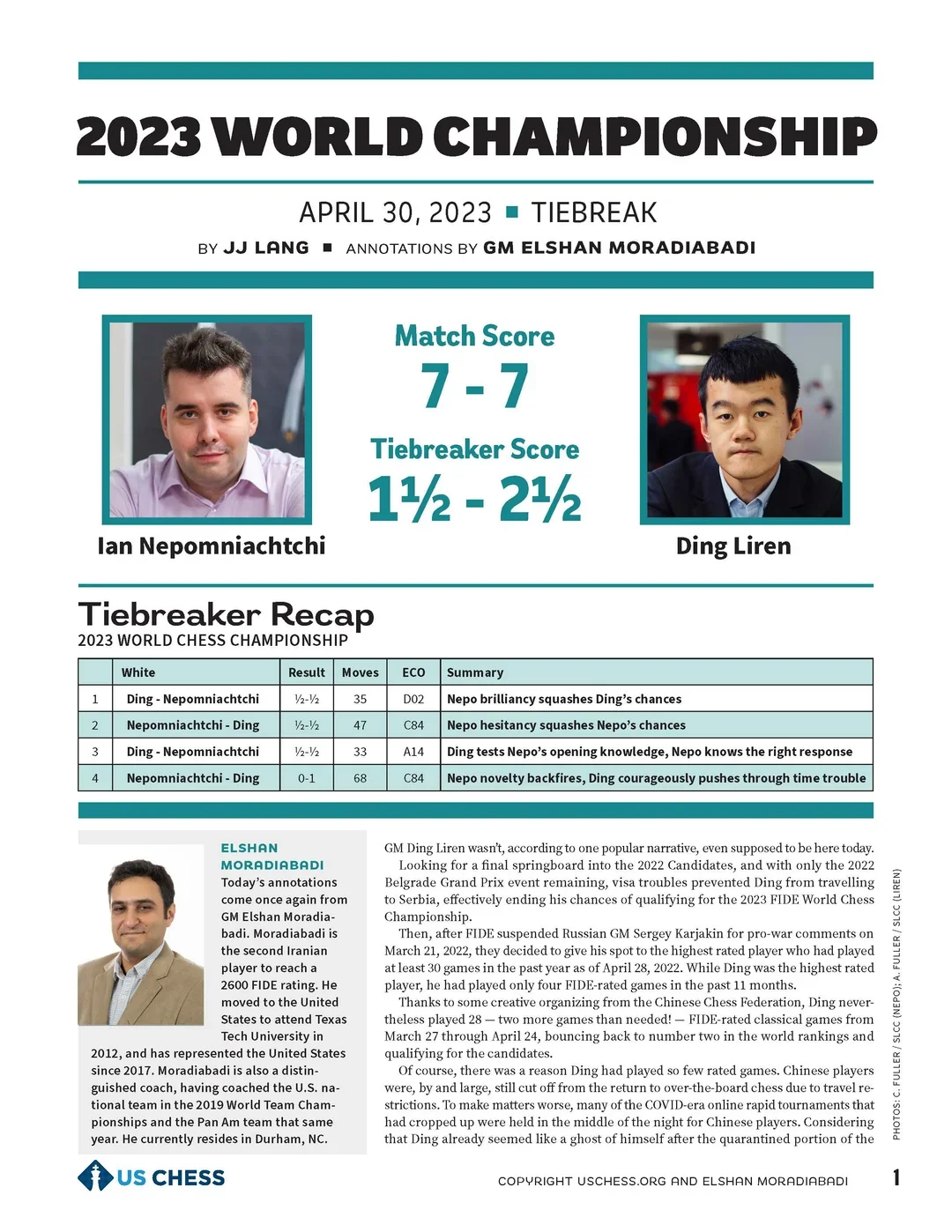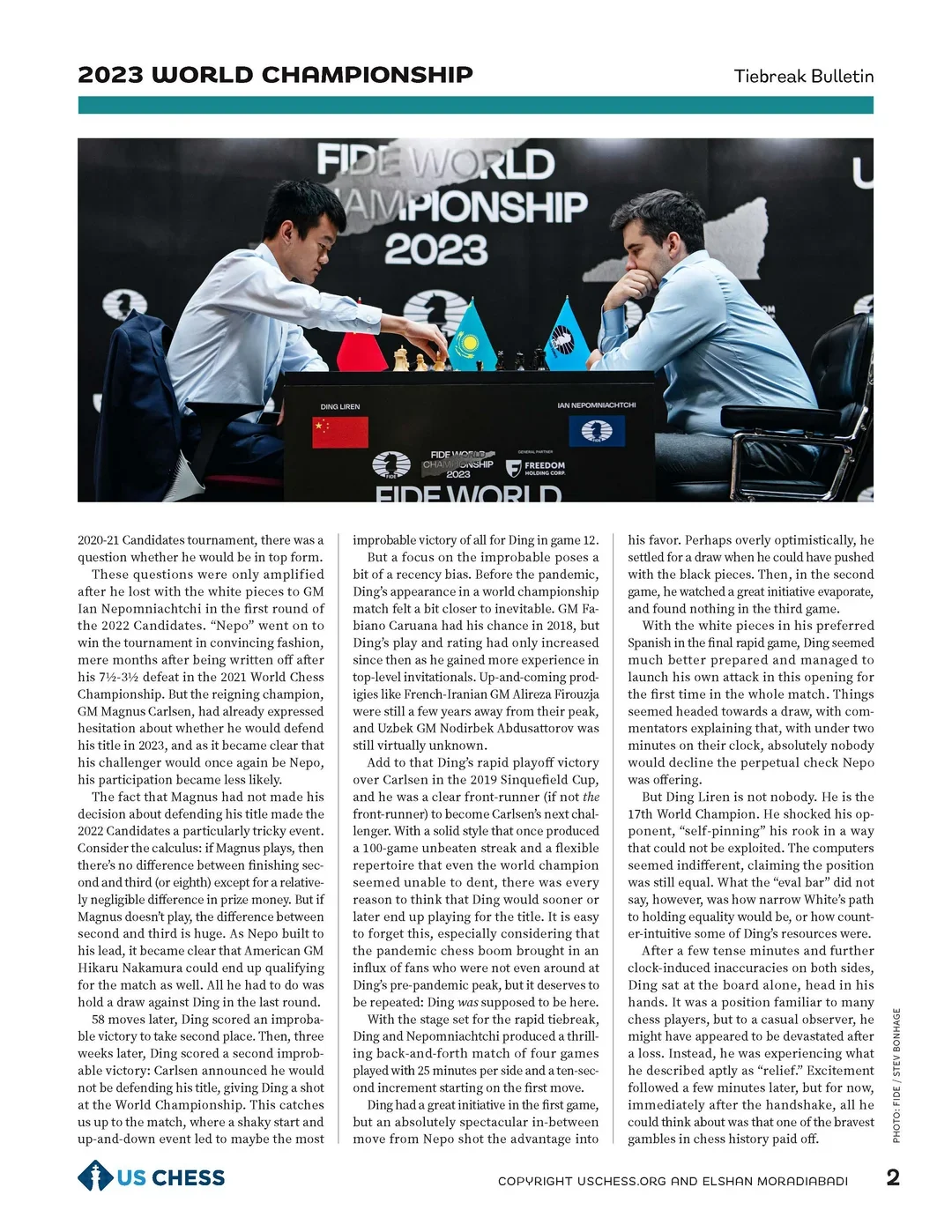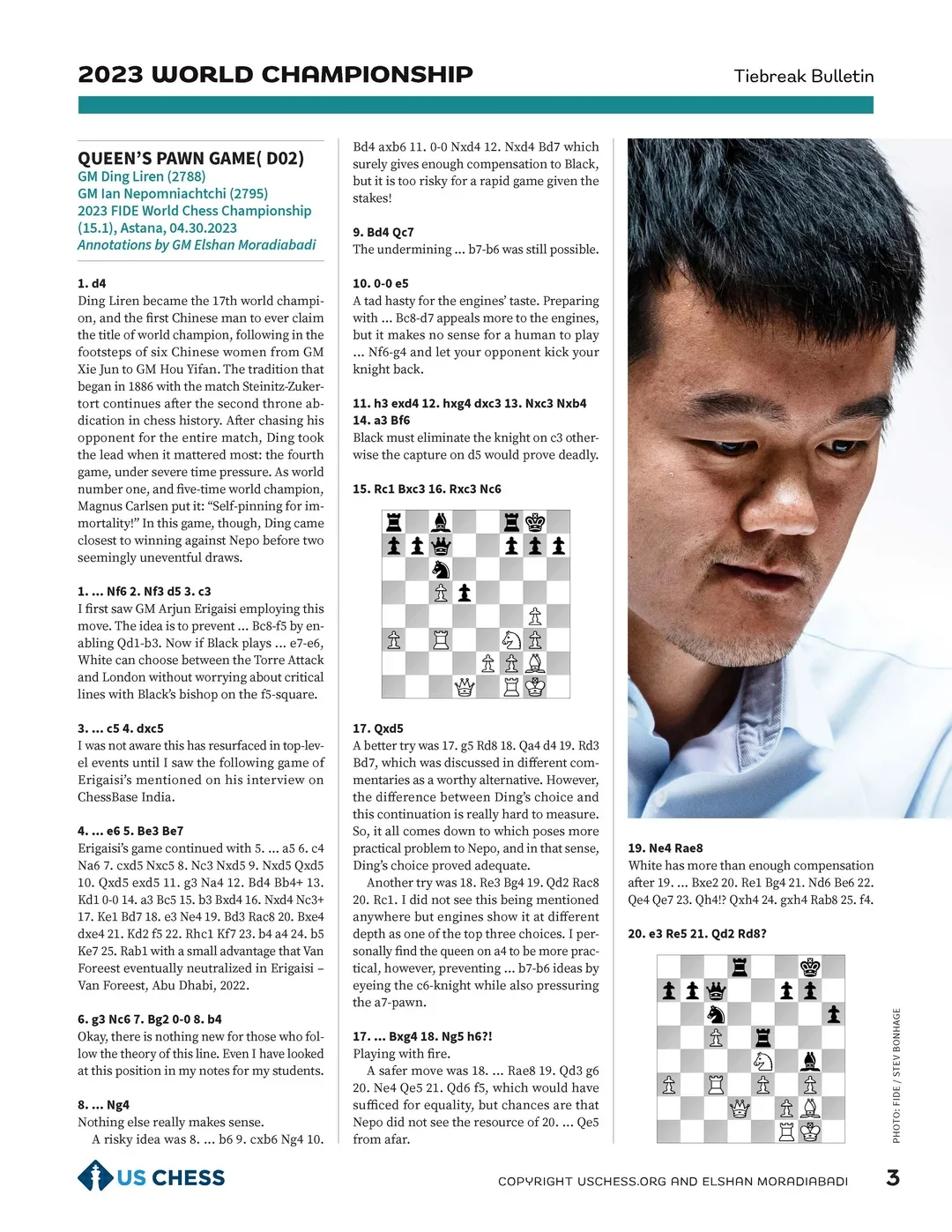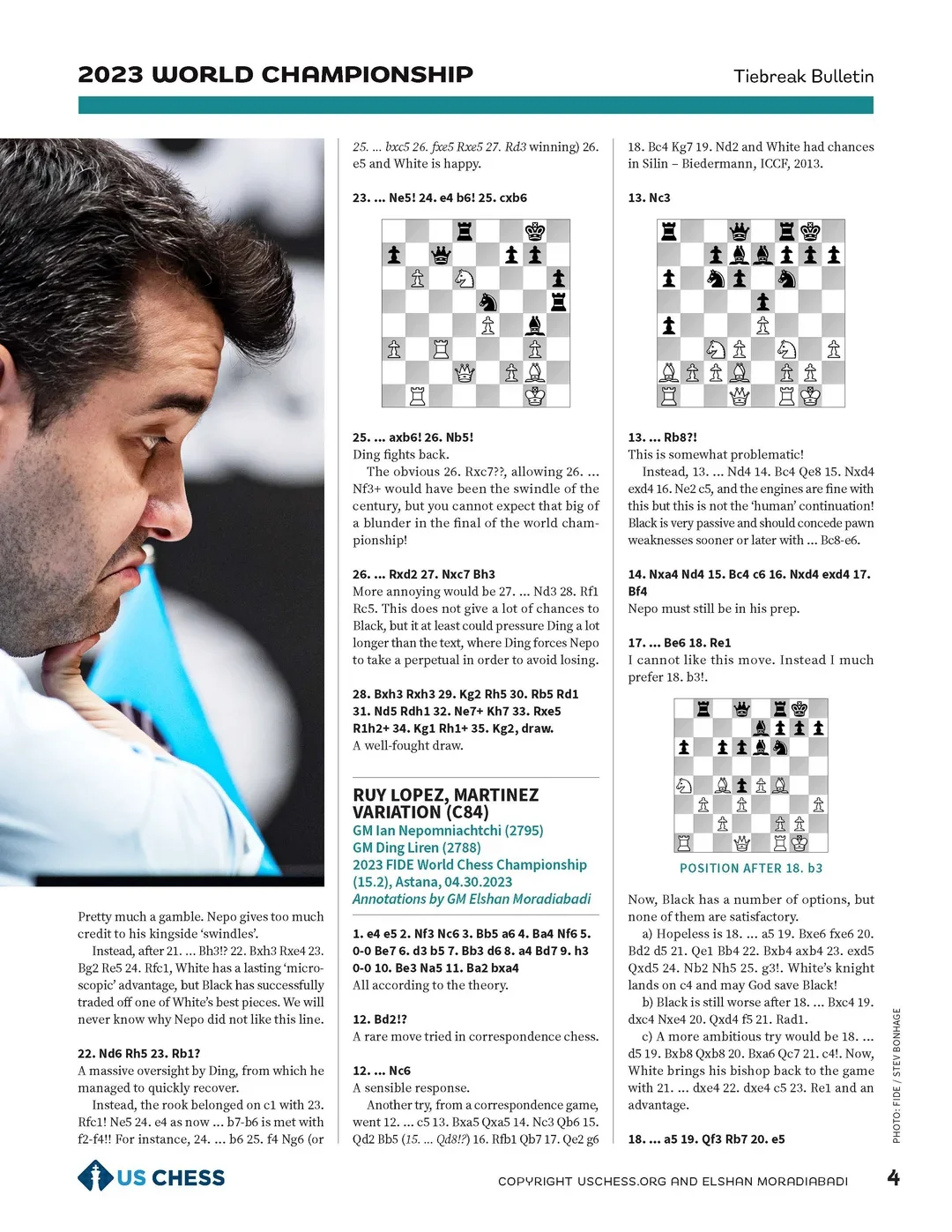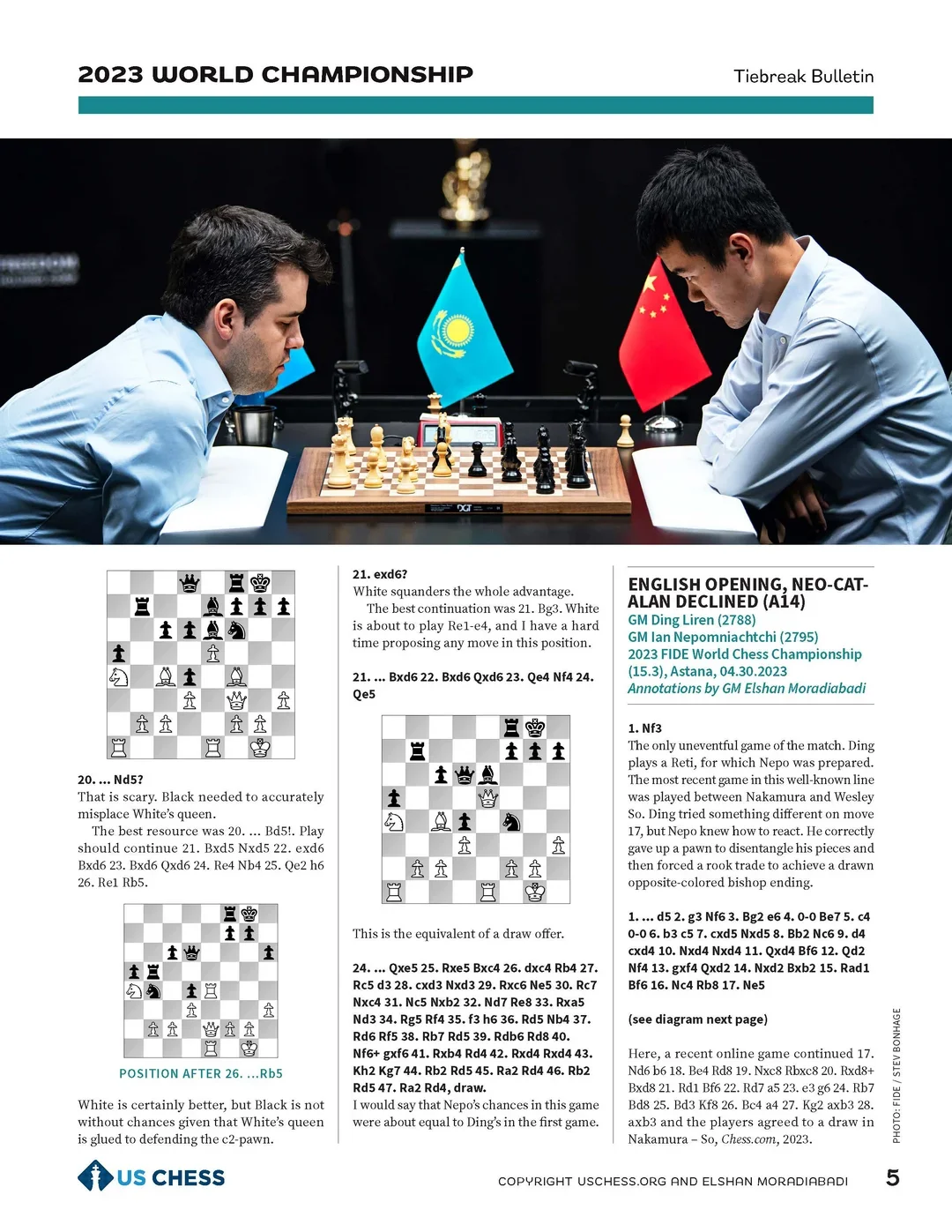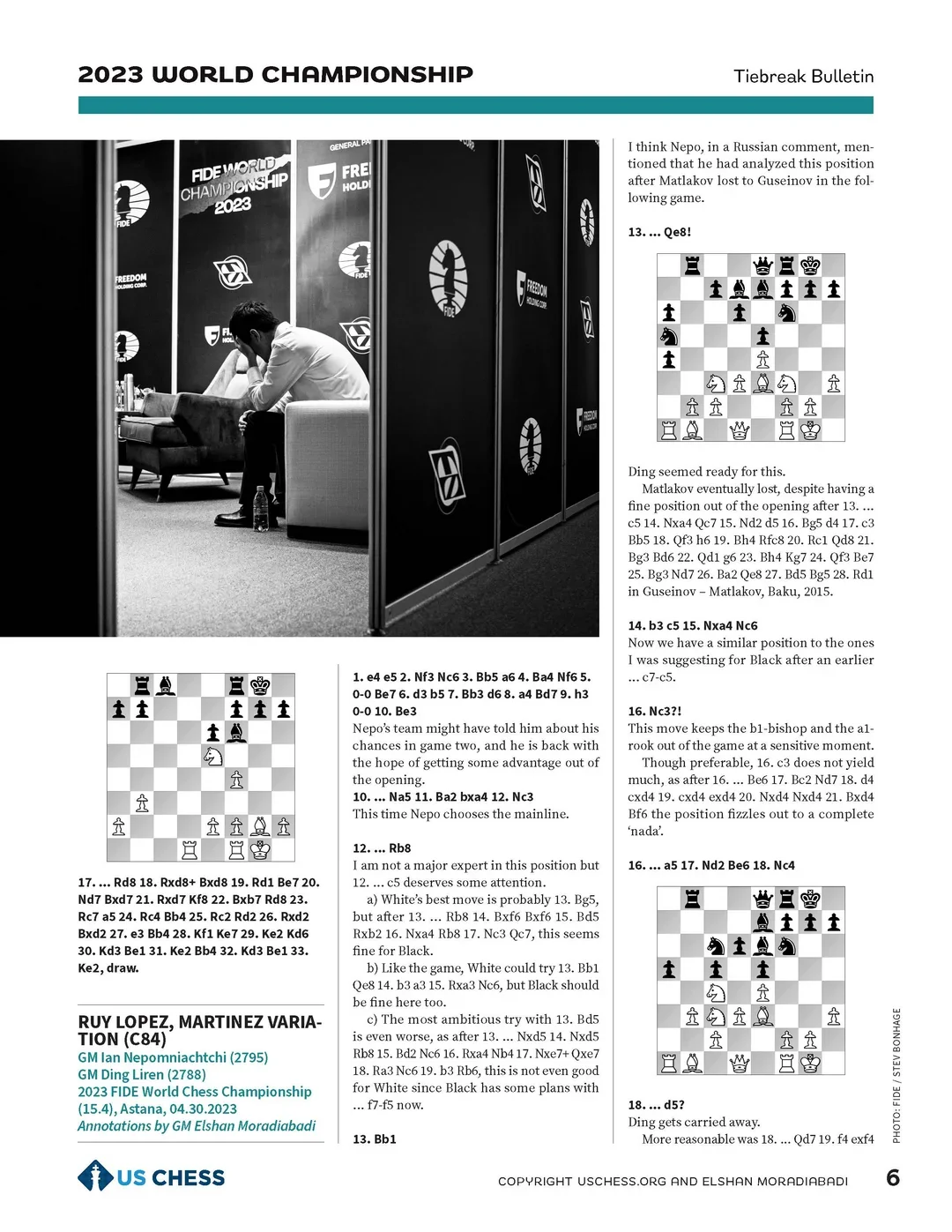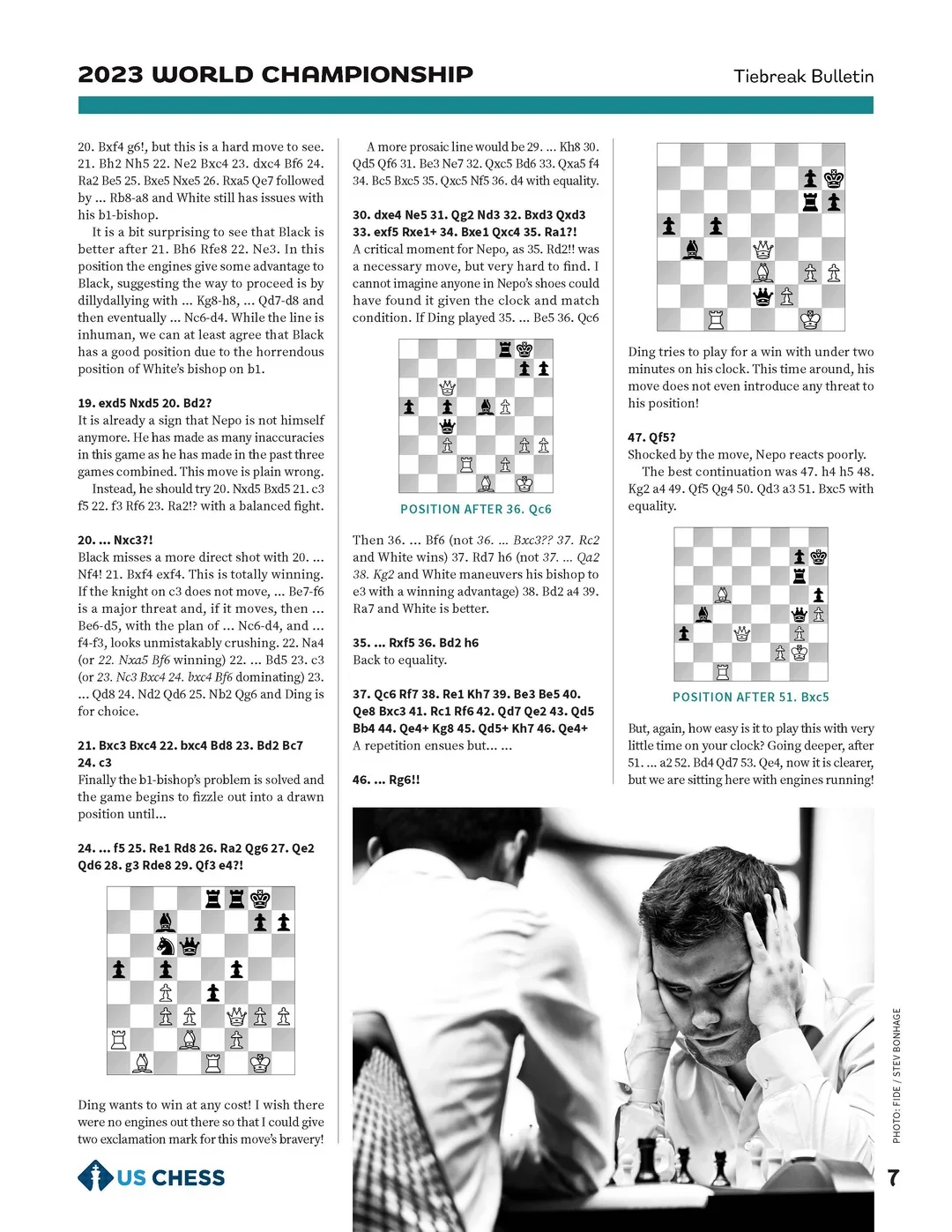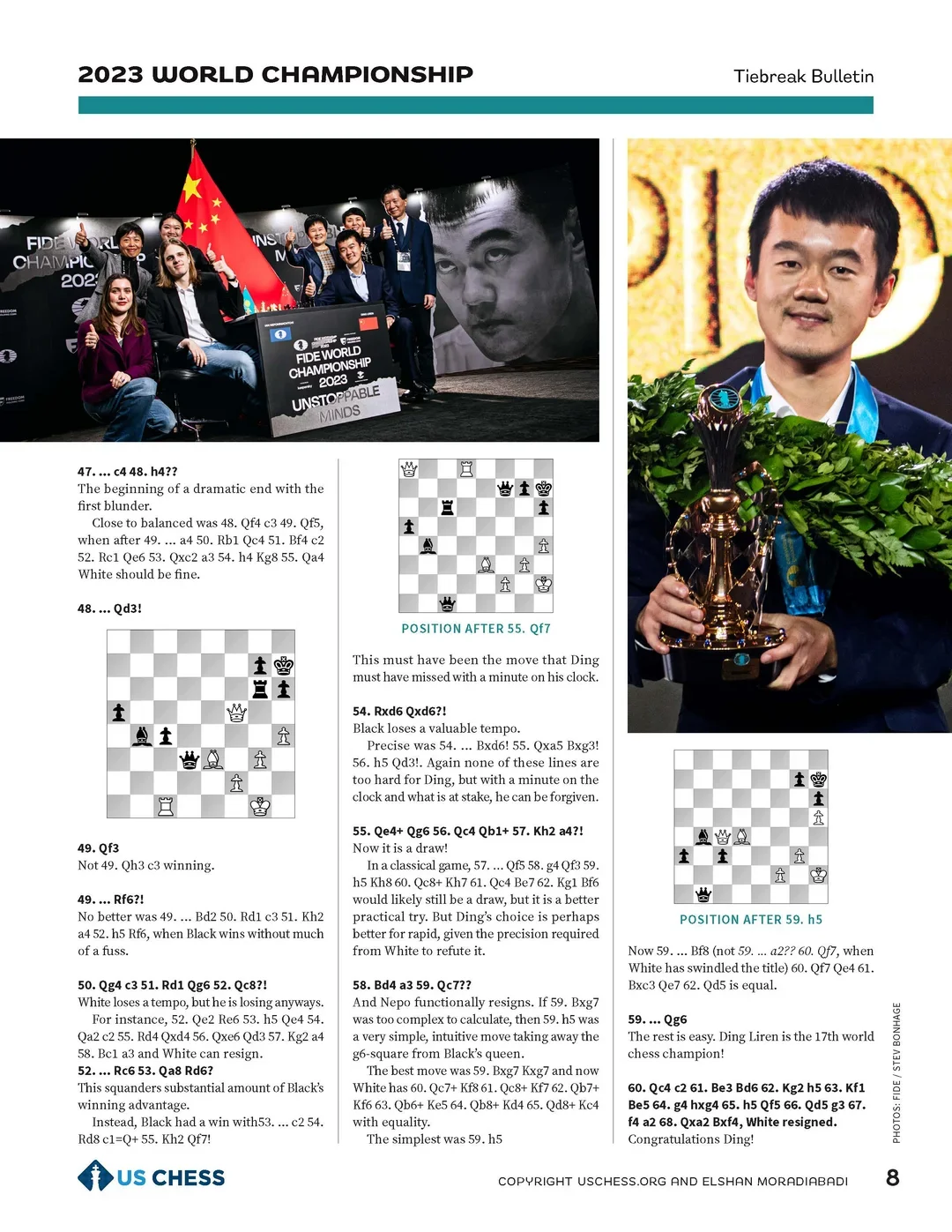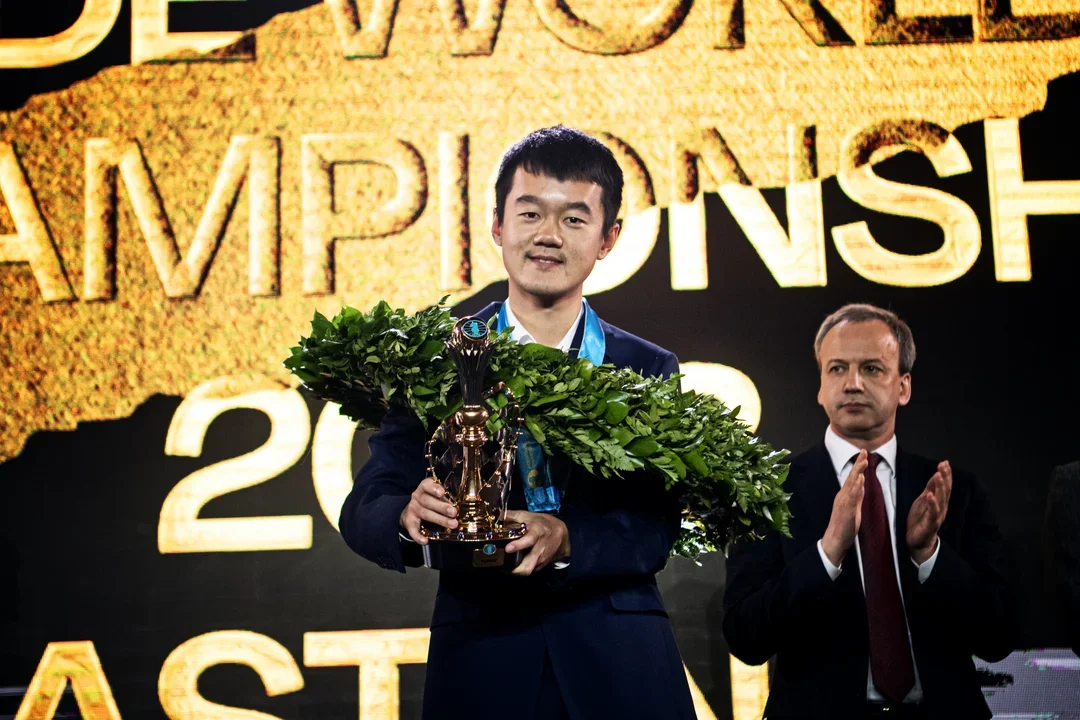
Please download our 15th and final bulletin and thank you so much for following along with US Chess these past three weeks!
GM Ding Liren wasn’t, according to one popular narrative, even supposed to be here today.
Looking for a final springboard into the 2022 Candidates, and with only the 2022 Belgrade Grand Prix event remaining, visa troubles prevented Ding from travelling to Serbia, effectively ending his chances of qualifying for the 2023 FIDE World Chess Championship.
Then, after FIDE suspended Russian GM Sergey Karjakin for pro-war comments on March 21, 2022, they decided to give his spot to the highest rated player who had played at least 30 games in the past year as of April 28, 2022. While Ding was the highest rated player, he had played only four FIDE-rated games in the past 11 months.
Thanks to some creative organizing from the Chinese Chess Federation, Ding nevertheless played 28 — two more games than needed! — FIDE-rated classical games from March 27 through April 24, bouncing back to number two in the world rankings and qualifying for the candidates.
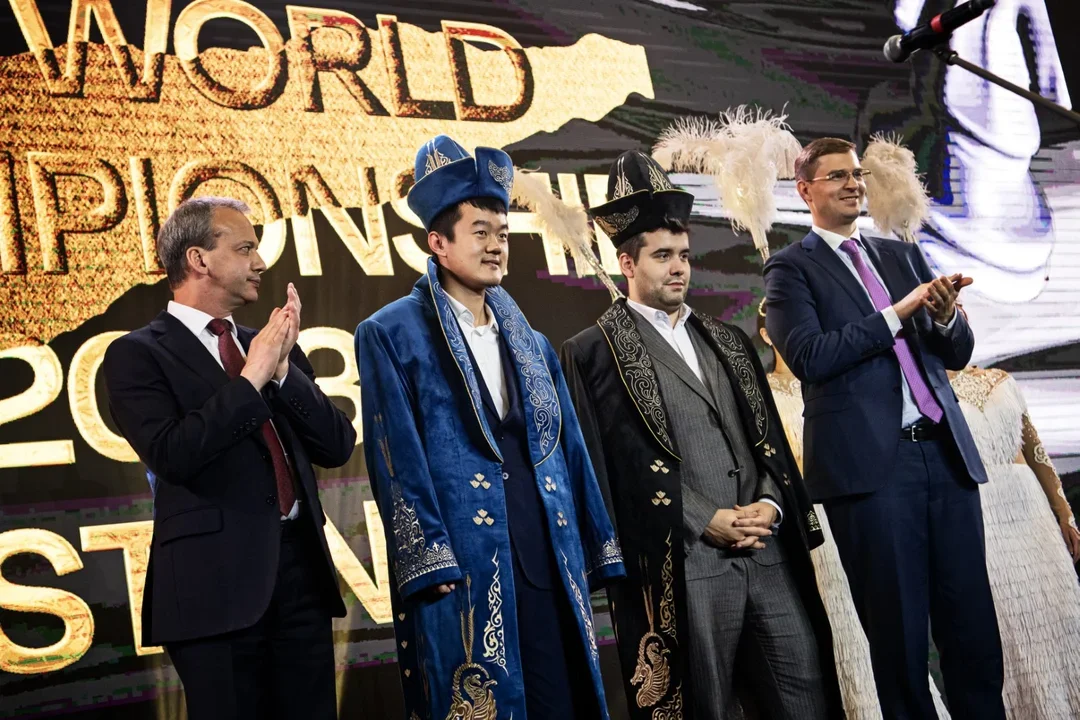
Of course, there was a reason Ding had played so few rated games. Chinese players were, by and large, still cut off from the return to over-the-board chess due to travel restrictions. To make matters worse, many of the COVID-era online rapid tournaments that had cropped up were held in the middle of the night for Chinese players. Considering that Ding already seemed like a ghost of himself after the quarantined portion of the 2020-21 Candidates tournament, there was a question whether he would be in top form.
These questions were only amplified after he lost with the white pieces to GM Ian Nepomniachtchi in the first round of the 2022 Candidates. “Nepo” went on to win the tournament in convincing fashion, mere months after being written off after his 7½-3½ defeat in the 2021 World Chess Championship. But the reigning champion, GM Magnus Carlsen, had already expressed hesitation about whether he would defend his title in 2023, and as it became clear that his challenger would once again be Nepo, his participation became less likely.
The fact that Magnus had not made his decision about defending his title made the 2022 Candidates a particularly tricky event. Consider the calculus: if Magnus plays, then there’s no difference between finishing second and third (or eighth) except for a relatively negligible difference in prize money. But if Magnus doesn’t play, the difference between second and third is huge. As Nepo built to his lead, it became clear that American GM Hikaru Nakamura could end up qualifying for the match as well. All he had to do was hold a draw against Ding in the last round.
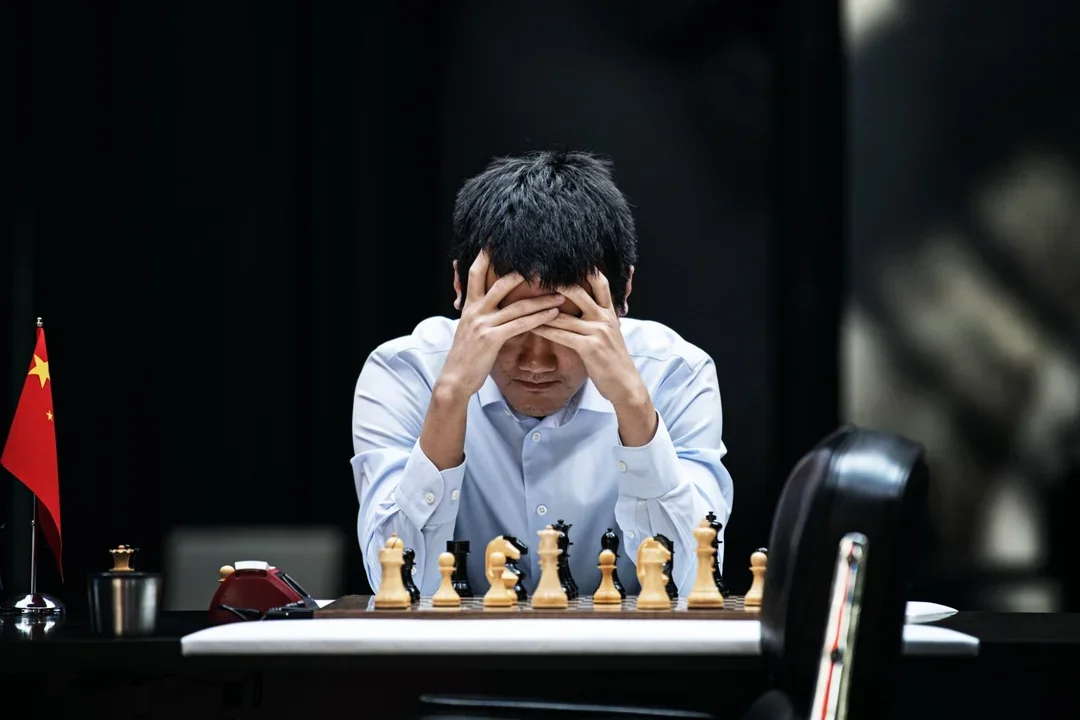
58 moves later, Ding scored an improbable victory to take second place. Then, three weeks later, Ding scored a second improbable victory: Carlsen announced he would not be defending his title, giving Ding a shot at the World Championship. This catches us up to the match, where a shaky start and up-and-down event led to maybe the most improbable victory of all for Ding in game 12.
That said, a focus on the improbable poses a bit of a recency bias. Before the pandemic, Ding’s appearance in a world championship match felt a bit closer to inevitable. GM Fabiano Caruana had his chance in 2018, but Ding’s play and rating had only increased since then as he gained more experience in top-level invitationals. Up-and-coming prodigies like French-Iranian GM Alireza Firouzja were still a few years away from their peak, and Uzbek GM Nodirbek Abdusattorov was still virtually unknown.
Add to that Ding’s rapid playoff victory over Carlsen in the 2019 Sinquefield Cup, and he was a clear front-runner (if not the front-runner) to become Carlsen’s next challenger. With a solid style that once produced a 100-game unbeaten streak and a flexible repertoire that even the world champion seemed unable to dent, there was every reason to think that Ding would sooner or later end up playing for the title. It is easy to forget this, especially considering that the pandemic chess boom brought in an influx of fans who were not even around at Ding’s pre-pandemic peak, but it deserves to be repeated: Ding was supposed to be here.
With the stage set for the rapid tiebreak, Ding and Nepomniachtchi produced a thrilling back-and-forth match of four games played with 25 minutes per side and a ten-second increment starting on the first move.
Ding had a great initiative in the first game, but an absolutely spectacular in-between move from Nepo shot the advantage into his favor. Perhaps overly optimistically, he settled for a draw when he could have pushed with the black pieces. Then, in the second game, he watched a great initiative evaporate, and found nothing in the third game.
With the white pieces in his preferred Spanish in the final rapid game, Ding seemed much better prepared and managed to launch his own attack in this opening for the first time in the whole match. Things seemed headed towards a draw, with commentators explaining that, with under two minutes on their clock, absolutely nobody would decline the perpetual check Nepo was offering.
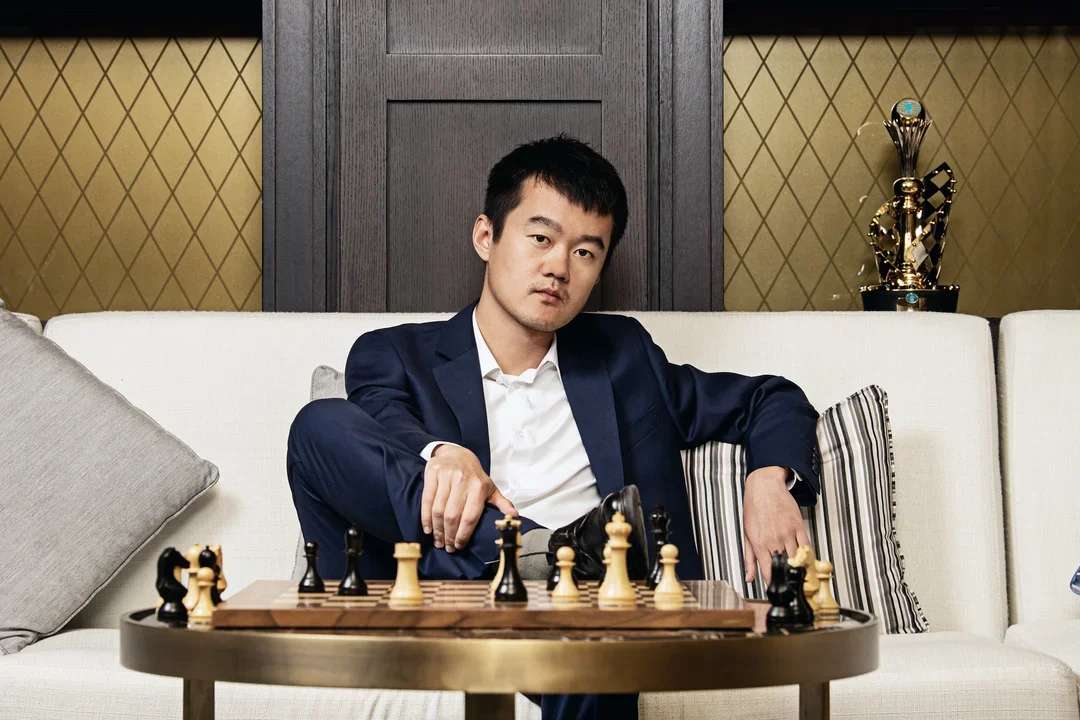
But Ding Liren is not nobody. He is the 17th World Champion. He shocked his opponent, “self-pinning” his rook in a way that could not be exploited. The computers seemed indifferent, claiming the position was still equal. What the “eval bar” did not say, however, was how narrow White’s path to holding equality would be, or how counter-intuitive some of Ding’s resources were.
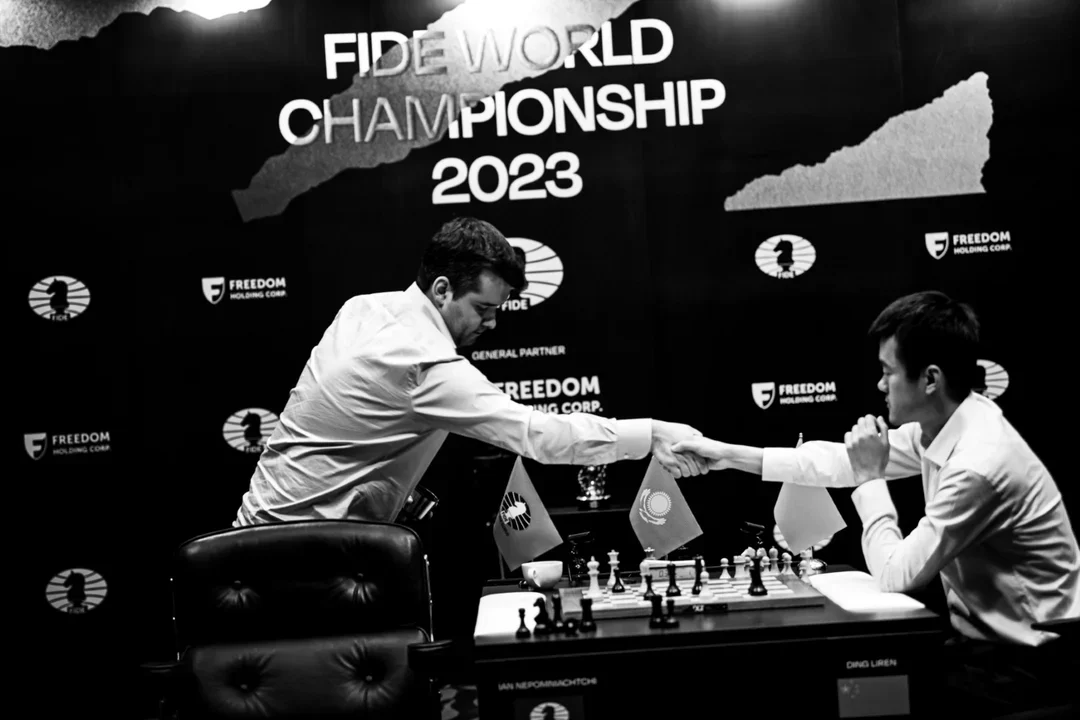
After a few tense minutes and further clock-induced inaccuracies on both sides, Ding sat at the board alone, head in his hands. It was a position familiar to many chess players, but to a casual observer, he might have appeared to be devastated after a loss. Instead, he was experiencing what he described aptly as “relief.” Excitement followed a few minutes later, but for now, immediately after the handshake, all he could think about was that one of the bravest gambles in chess history paid off.
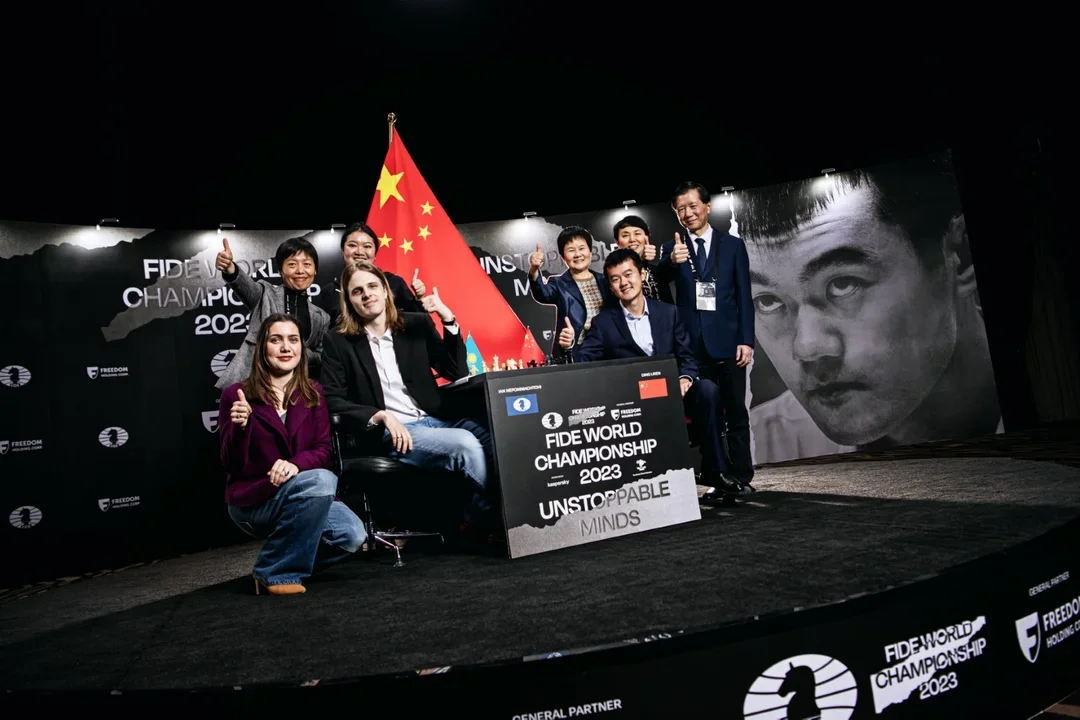
Today’s annotations come once again from GM Elshan Moradiabadi. Moradiabadi is the second Iranian player to reach a 2600 FIDE rating. He moved to the United States to attend Texas Tech University in 2012, and has represented the United States since 2017. Moradiabadi is also a distinguished coach, having coached the U.S. national team in the 2019 World Team Championships and the Pan Am team that same year. He currently resides in Durham, NC.
See all of our 2023 FIDE World Championship coverage.
Categories
Archives
- January 2026 (1)
- December 2025 (27)
- November 2025 (29)
- October 2025 (39)
- September 2025 (27)
- August 2025 (29)
- July 2025 (43)
- June 2025 (25)
- May 2025 (24)
- April 2025 (29)
- March 2025 (29)
- February 2025 (20)
- January 2025 (24)
- December 2024 (34)
- November 2024 (18)
- October 2024 (35)
- September 2024 (23)
- August 2024 (27)
- July 2024 (44)
- June 2024 (27)
- May 2024 (31)
- April 2024 (51)
- March 2024 (34)
- February 2024 (25)
- January 2024 (26)
- December 2023 (29)
- November 2023 (26)
- October 2023 (37)
- September 2023 (27)
- August 2023 (37)
- July 2023 (47)
- June 2023 (33)
- May 2023 (37)
- April 2023 (45)
- March 2023 (37)
- February 2023 (28)
- January 2023 (31)
- December 2022 (23)
- November 2022 (32)
- October 2022 (31)
- September 2022 (19)
- August 2022 (39)
- July 2022 (32)
- June 2022 (35)
- May 2022 (21)
- April 2022 (31)
- March 2022 (33)
- February 2022 (21)
- January 2022 (27)
- December 2021 (36)
- November 2021 (34)
- October 2021 (25)
- September 2021 (25)
- August 2021 (41)
- July 2021 (36)
- June 2021 (29)
- May 2021 (29)
- April 2021 (31)
- March 2021 (33)
- February 2021 (28)
- January 2021 (29)
- December 2020 (38)
- November 2020 (40)
- October 2020 (41)
- September 2020 (35)
- August 2020 (38)
- July 2020 (36)
- June 2020 (46)
- May 2020 (42)
- April 2020 (37)
- March 2020 (60)
- February 2020 (38)
- January 2020 (45)
- December 2019 (34)
- November 2019 (35)
- October 2019 (42)
- September 2019 (45)
- August 2019 (56)
- July 2019 (44)
- June 2019 (35)
- May 2019 (40)
- April 2019 (48)
- March 2019 (61)
- February 2019 (39)
- January 2019 (30)
- December 2018 (29)
- November 2018 (51)
- October 2018 (45)
- September 2018 (29)
- August 2018 (49)
- July 2018 (35)
- June 2018 (31)
- May 2018 (39)
- April 2018 (31)
- March 2018 (26)
- February 2018 (33)
- January 2018 (30)
- December 2017 (26)
- November 2017 (24)
- October 2017 (30)
- September 2017 (30)
- August 2017 (31)
- July 2017 (28)
- June 2017 (32)
- May 2017 (26)
- April 2017 (37)
- March 2017 (28)
- February 2017 (30)
- January 2017 (27)
- December 2016 (29)
- November 2016 (24)
- October 2016 (32)
- September 2016 (31)
- August 2016 (27)
- July 2016 (24)
- June 2016 (26)
- May 2016 (19)
- April 2016 (30)
- March 2016 (36)
- February 2016 (28)
- January 2016 (32)
- December 2015 (26)
- November 2015 (23)
- October 2015 (16)
- September 2015 (28)
- August 2015 (28)
- July 2015 (6)
- June 2015 (1)
- May 2015 (2)
- April 2015 (1)
- February 2015 (3)
- January 2015 (1)
- December 2014 (1)
- July 2010 (1)
- October 1991 (1)
- August 1989 (1)
- January 1988 (1)
- December 1983 (1)


